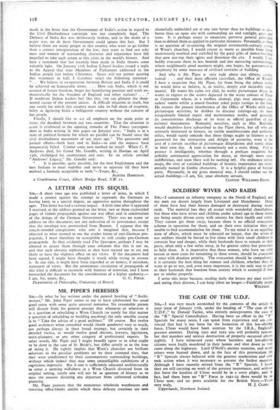MR. PIPER'S HERESIES
Sne,—In what he has written under the general heading of " Archi- tecture," Mr. John Piper seems to me to have adulterated his usual good sense with some quite unusual nonsense. No reasonable person will dissent from his general precept that whenever or wherever it is a question ot rebuilding a Wren Church (or surely for that matter a question of rebuilding or building anything) the only sensible course is to "Take the advice of a good architect." Of course. But twelve good architects when consulted would (thank goodness) vary as much, not perhaps always in their broad strategy, but certainly in their detailed tactics, as would twelve good doctors, lawyers, legislators, town-planners, or any other category of professional experts. In other words, Mr. Piper and I might broadly agree as to what ought to be done in the case of St. Bride's' but differ utterly as to the how of doing it. He rightly implies that Wren's churches are brilliant solutions to the peculiar problems set by their cramped sites, that they were conditioned by their contemporary surrounding buildings, without which indeed they may seem unintelligible exhibitions of a capricious ingenuity. But if one is sufficiently educated architecturally to sense a seeming wilfulness in a Wren Church divorced from its original setting, surely one will not be so ignorant of history as to miss the reasons dictating any departure from unfettered orthodox planning.
Mr. Piper protests that the monstrous wholesale warehouses and towering office-blocks amidst which these delicate creations are noW
shamefully embedded are at any rate better than no buildings at all— better than an open site with surrounding air and sunlight, grass and trees. It is perhaps easier to enunciate perverse general principles than to defend them as applied to particular instances. Personally, as there is no question of re-creating the original seventeenth-century setting of Wren's churches, I would rescue as many as possible from being monstrously overlaid and stultified by the great piles of dunce-building that now out-top their spires and dominate the city. I would, I say, boldly evacuate them to less boorish and less menacing surroundings, where neighbourly good manners might, one hopes, be guaranteed in perpetuity by some measure of civilised restraint of building.
And why is Mr. Piper sc very rude about our abbeys, ' castles, tumuli . . . and their most efficient custodian, the Office of Works? I have a suspicion that Mr Piper, far from being the robust realist he would have us believe, is, in reality, deeply and incurably senti- mental. He wants his ruins ivy clad, he wants picturesque decay, he wants to regress to the scenes depicted in the water colours of Prow or Cattermole where, in a roofless chancel, pigs rout amongst cru- saders' tombs whilst a smock-frocked yokel pulps turnips in the font. He resents the prosaic interference of the Office of Works with such picturesque activities, he dislikes its discreet tidyings-up, its most scrupulously limited repair and maintenance works, and generally its conscientious discharge of its trust as official guardian of our national monuments. Romantic novelists, such as Mrs. Radcliffe, would doubtless have subscribed to the Piper thesis, but all who are seriously interested in history, its visible manifestations and authentic relics, would surely concede that these things ought in fairness to be preserved for the instruction and delight of posterity, even at the cost of a certain sacrifice of picturesque dilapidation and rustic abuse in their own day. A ruin is notoriously not a static thing. Fail to protect it intelligently, whether through a perhaps exquisite but selfishly sentimental appreciation for decay, or through mere crass indifference, and soon there will be nothing left. On ordnance survey maps, the sites of vanished buildings of historic importance are rever- entially named in Gothic characters. It is a helpful piece of belated piety. Personally, in my gross material way, I should rather see the actual buildings.—I am, Sir, your obedient servant,
CLOUGH WILLIAMS-ELLIS.






























 Previous page
Previous page